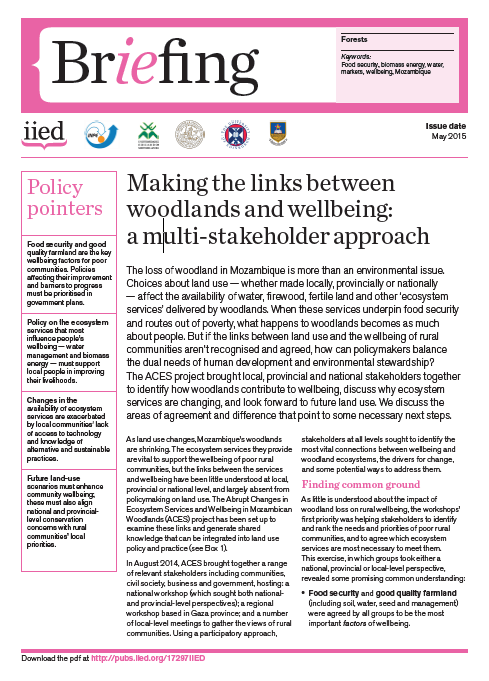Focal point
Location
Mission
Our mission is to build a fairer, more sustainable world, using evidence, action and influence in partnership with others.
Who we are
IIED is one of the world’s most influential international development and environment policy research organisations. Founded in 1971 by economist Barbara Ward, who forged the concept and cause of sustainable development, we work with partners on five continents. We build bridges between policy and practice, rich and poor communities, the government and private sector, and across diverse interest groups. We contribute to many international policy processes and frameworks, including the Intergovernmental Panel on Climate Change, the Millennium Ecosystem Assessment and the UN conventions on climate change and biological diversity.
What we do
IIED carries out research, advice and advocacy work. We carry out action research — generating robust evidence and know-how that is informed by a practical perspective acquired through hands-on research with grassroots partners — and we publish in journals and maintain high research standards. We advise government, business and development agencies, and we argue for changes in public policy. We focus on bottom-up solutions, stay open to flexible, adaptable solutions and are marked by a tradition of challenging conventional wisdom through original thinking.
Resources
Displaying 196 - 200 of 367The Contested Status of ‘Communal Land Tenure’ in South Africa
Focuses on communal tenure reform developments (or lack thereof), referring to law, policy and practice in rural areas in South Africa. Shows that communal land tenure is not in a healthy state and discusses the following recent laws and policies that are symptoms of this ill health: the Communal Land Rights Act (struck down by the Constitutional Court); the Traditional Leadership and Governance Framework Act (passed in 2003); and the 2014 Communal Land Tenure ‘wagon wheel’ policy (currently in place).
Making the links between woodlands and wellbeing: a multi-stakeholder approach
The loss of woodland in Mozambique is more than an environmental issue. Choices about land use — whether made locally, provincially or nationally — affect the availability of water, firewood, fertile land and other ‘ecosystem services’ delivered by woodlands. When these services underpin food security and routes out of poverty, what happens to woodlands becomes as much about people.
Agro-industrial investments in Cameroon: Large-scale land acquisition since 2005
In recent years, Cameroon has been approached by growing numbers of local and international investors wanting to acquire arable land for large-scale agro-industrial operations. This study takes a closer look at large-scale land acquisitions since 2005. Examining the legal framework and the practical implications of these land acquisitions, it shows that there is a risk that they will affect the long-term capacity of communities to preserve their traditional way of living.
Growing sustainable agriculture in Mozambique
In Mozambique there is strong support for sustainable agriculture from different actors, with approaches including agroforestry and conservation agriculture increasingly promoted throughout the country by the
Ministry of Agriculture, civil society, farmers’ groups and development agencies. Research trials and anecdotal evidence suggest that these practices increase yields, are more resilient and are economically accessible for small-scale farmers. Despite this, uptake among smallholders remains low.
Apoiando a agricultura sustentável em Moçambique
Em Moçambique há um forte apoio à agricultura sustentável: métodos como sistemas agroflorestais e agricultura de conservação são promovidos cada vez mais pelo Ministério da Agricultura, a sociedade civil, organizações de camponeses e agências de desenvolvimento. Resultados de investigações sugerem que essas práticas aumentam a produtividade, são mais resilientes e economicamente acessíveis. Apesar disso, a adoção pelos pequenos produtores permanece baixa.







